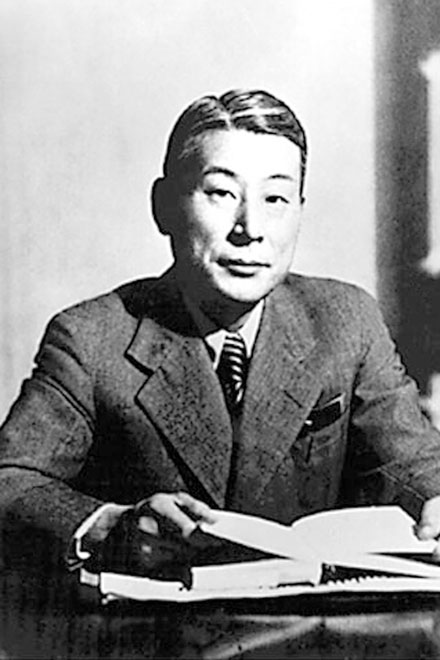By Akari Terouchi
The North American Post
Gratitude to Chiune Sugihara from Mr. Leo Melamed, honorary chairman of CME Group
Leo Melamed, Honorary Chairman of the Chicago Mercantile Exchange (CME) Group, who founded financial futures, trading products and the first electronic trading system, visited Prime Minister Abe, Mayor of Tsuruga, Fukui and Waseda University in 2014. He was born in Poland and was one of the Jews saved by “Visas for Life,” which were issued by Chiune Sugihara. Sugihara was the Japanese diplomat who issued many visas to Jewish people based on his humanitarian stance during World War II. Melamed showed respect for this decision and so visited groups and lands related to his own memories.
“Visas for Life”
Sugihara was born in Gifu in 1900. He passed an examination for diplomats studying abroad and so continued studying at public expense after graduating from Waseda High Teacher Department. Then, he gained a track record as a diplomat and moved to Kaunas, Lithuania with his family to establish the first Japanese Consulate in 1939. At that time in Europe, the warfare had been intensifying and persecution of the Jews became more serious.
Many Jews gathered in front of the Japanese Consulate to get Japan’s transit visa in the early morning on July 18, 1940. Sugihara issued their visas beyond the intentions of the Ministry of Foreign Affairs of Japan. He continued issuing at the hotel after retreating from the Consular Office and handed the last visa from the window of the train on the day of his departure. These visas were later referred to as “Visas for Life.”
Sugihara refected back to that time and spoke of it as follows.
“When I received the first response, I deliberated all night long until I could not think any longer. I knew that if I were to obey the Ministry and not issue the Japan transit visas to the refugees, it would be considered following orders and I would not be criticized. Any diplomat in my situation would likely have chosen to follow orders and refuse to issue the visas. After all, every diplomat is worried about not being promoted or being dismissed due to conduct or legal violations. That is why, quite honestly, when I received the response, I thought about it all night. Would it serve the national interest to follow orders thoughtlessly, recklessly, and irresponsibly, like a group of mercenaries? Would it serve the national interest to follow the Nazi’s policy and earn the resentment of the Jewish people for all time? I could refuse to issue the visas based on in-complete travel documentation or public safety concerns, but would that be for our nation’s benefit? Finally, after soul-searching, I concluded that humanity and generosity are above all things and, fearing nothing, I issued the visas risking my career. I still believe I was right.” (From the website of Chiune Sugihara Memorial Hall)
Melamed escaped to Lithuania with his family in 1932 after Nazis had invaded Poland. He then visited the Japanese Consular Office to flee from Europe via Japan and got his “Visa for Life.” The family arrived at Tsuruga Port in Fukui, Japan via the Siberian Railway and then moved to the United States.
Chiune Sugihara after World War II
Sugihara was dismissed from the Ministry of Foreign Affairs when he went back to Japan after World War Ⅱ because he issued Japanese transit visas to Jews and ignored his orders. It was in 1991 that Sugihara recovered his honor at the Japanese Ministry of Foreign Affairs, five years after his death.
A reunion between Sugihara and the Jewish people occurred in 1968. In order to thank Sugihara, a certain Jew visited him with his “Visa for Life” in hand. In the following year, Sugihara received a medal from the Minister of Israel Religious Affairs Balahufutik, who was also saved by “Visas for Life,” and received the “People’s Award of Justice Among Peoples” from Israel in 1985. The following year, Sugihara died at the age of 86 in Kamakura, Kanagawa.
Waseda University, his alma mater, commemorated the 25th anniversary of Sugihara’s death and set up an honorable monument on which was carved “not a diplomat, but a correct decision naturally as a human being.” Ambassadors of Israel, Lithuania and Poland were also present at the unveiling ceremony.
Seventy-three years have passed since the issuance of “Visas for Life.” When Leo visited Tsuruga again, he said that he remembered his impression was without words. “Everyone can change society. We have to defend life because it is valuable and irreplaceable. Sugihara proved it,” he told children in an elementary school. Tsuruga City still has a facility called “Tsuruga Museum,” which keeps historical materials of the time. At that time, local people accepted refugees by warmly offering apples and opening public baths.
About 6,000 displaced Jews were saved by “Visas for Life”. According to the resolution of the United Nations General Assembly in January 27, 2005, the day on which Auschwitz’s Jewish concentration camps released its detainees was declared as “International Day Recalling Holocaust Victims.” As part of the related event, a movie about Sugihara was screened at the United Nations New York Headquarters and in Israeli Jerusalem. Sugihara, who was nicknamed Senpo, is still widely known in the world.





